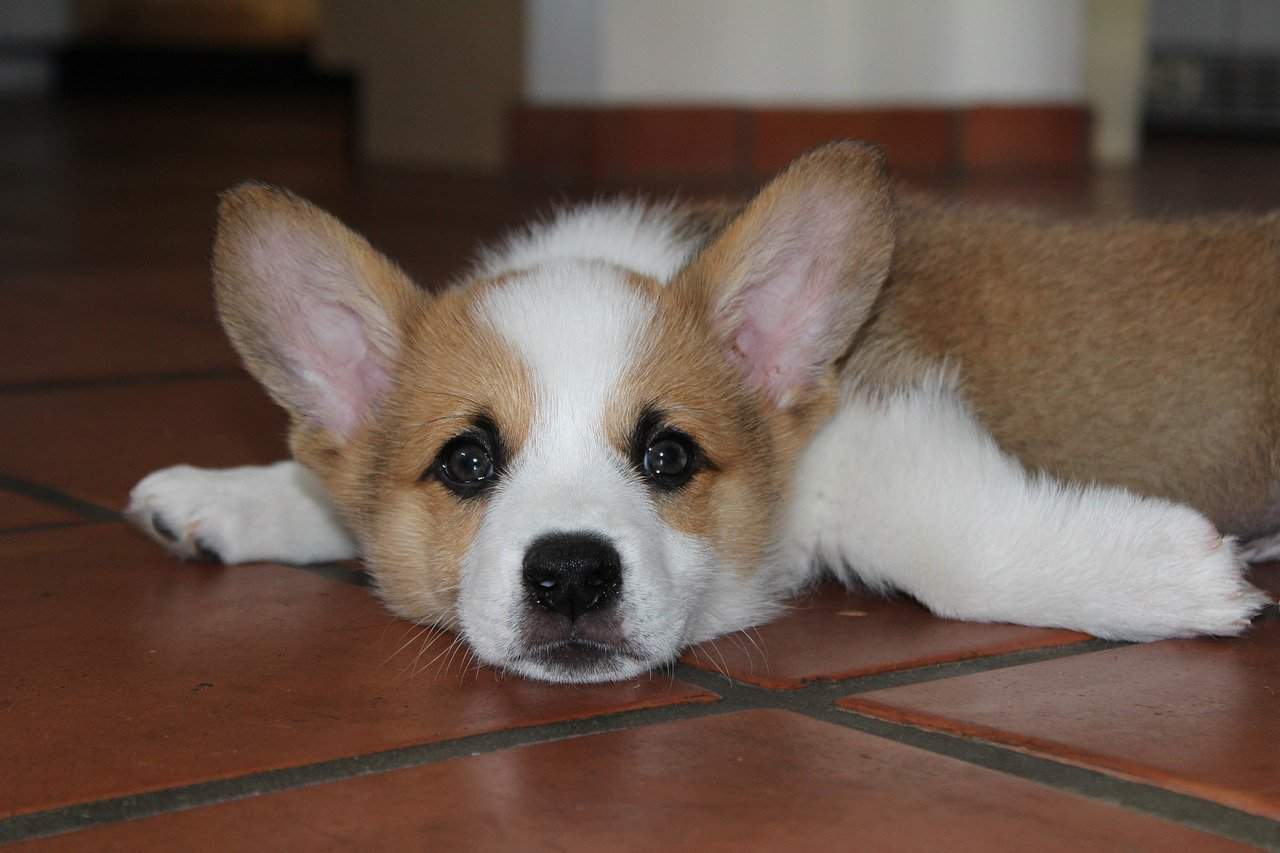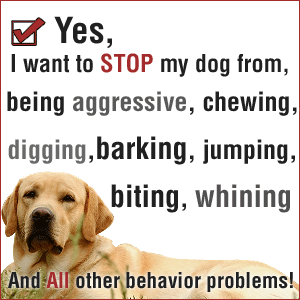More often than not, the answer to the question of why does my dog keep staring at me is because it wants attention.
Other common reasons for the stare include confusion, stress, and aggression.
Why Does My Dog Keep Staring at Me
One day, there I am, in the kitchen, making lunch, and I turn around only to see my dog staring at me.
The next day, I’m sitting in the living room, watching TV, and I find my dog, at it again. So I began wondering, why does my dog keep staring at me?
After some serious research on dog behavior, here’s what I found are the most common reasons for a dog’s gaze.
Why Does My Dog Keep Staring at Me?
Even though I knew that my dog loves me, I found that the constant staring meant something more than him just wanting cuddles.
While that might be the most common reason, there are a ton of other possible answers to the question of why does my dog keeps staring at me.
In most cases, a dog is trying to communicate something or interact with us.
Unlike most other animals in the world, dogs can read our emotions or anticipate what we want from them.
Also, just like a gaze between two people can be nuanced, so can the one we share with our dogs.
Of course, while context is key in every situation, here are the most common reasons for a dog’s stare.
The Dog Wants Attention
Yes, if a dog is giving us the “puppy dog eyes” and staring lovingly, it most likely wants attention. It might want affection, a pat on the head, or to snuggle up.
On the other hand, when a dog keeps staring for no apparent reason, it might want a toy that we took away from it.
We should keep in mind that a dog is only doing this because we’ve taught it to.
Each time we would absent-mindedly pet our dog, or let it play outside without realizing that it was staring at us, we were unknowingly condoning this kind of behavior.
So now, the dog thinks that it got what it wanted thanks to the stare.
While it’s better than barking, jumping, or scratching when it wants to get attention, staring can still be annoying.
The Dog Wants Food
Now, dogs aren’t really mysterious creatures. With that said, when a dog looks like it’s peering into our soul, it probably wants food.
In fact, I believe that if it were up to my dog, he’d probably never stop asking for treats.
Sometimes, a dog might pair its signature puppy eyes with some whimpering and pleading.
However, just because a dog is staring intently at its bowl doesn’t mean we should give in and feed it.
Of course, how often a dog should eat depends on its age, breed, and size. But don’t forget that most adult dogs should typically only be fed twice a day.
If we want to keep the dog trained and disciplined, we should have it on a consistent feeding schedule.
Your Dog Is Showing Affection
Right after attention and food, the top answer to the question of why does my dog keeps staring at me is to show love and appreciation.
Once a dog has developed a strong emotional connection with us, it will try to show it.
Of course, not all dogs are the same, and instead of staring, some want to lick our faces or lie on top of us.
However, on occasion, timid dogs or rescue dogs might not feel comfortable doing that. Instead, they’ll just gaze into our eyes to show us how much we mean to them.
Your Dog Is Confused
When a dog does its signature head tilt from side to side while staring at us, it might mean that it’s confusing.
Most often, puppies or dogs that are in training get this goofy look on their faces.
However, if the dog is already well-trained, chances are, it’s just waiting for the next clue.
For instance, if we’re on a walk and we stop to cross at a red light, the dog will look up at us to see if it should stop or keep going.
On the other hand, a dog might be staring because it’s confused by something that we’re doing.
For example, if we’re making weird noises, a dog will immediately try to figure out what’s going on.
The Dog Is Tense or Stressed Out
Just like any human, dogs can easily get anxious or nervous. Often, if a dog hears a loud noise coming from outside, like fireworks, for example, it’ll get scared.
Also, while we might think it’s adorable, a dog can feel stressed when we try to dress it up.
Since dogs are nudists by nature, they usually don’t enjoy wearing small coats or booties.
So if we see a pleading, mournful look in our dog’s eyes, it’s probably trying to tell us that it’s not enjoying itself.
The Dog Is Guilty of Something
Now, the look of guilt is one of my favorite ones because it’s so unique. Every time I walk into my bathroom and see the toilet paper scattered everywhere, I know what to expect.
I’m about to see my dog hiding in shame somewhere in the corner.
In my experience, a dog has two guilty looks always ready. The first one we see before we catch it doing something it knows it’s not supposed to.
We’ll see the same look when the dog’s already been mischievous. Either way, I always found the guilty look hilarious, albeit annoying.
The Dog Needs Protection
Another possible answer to the question of why does my dog keep staring at me is that it might be feeling defenseless.
That’s because, when pooping, a dog has to crouch and it can’t defend itself against potential attackers or predators.
So at that moment, it’s looking up at us, asking us to watch its back in case something goes wrong.
Again, even though some find this sort of behavior weird or even annoying, it’s just a sign of endearment.
If a dog’s looking at us while it’s pooping, it means that it trusts us to protect it.
The Dog Is on the Prowl
Most herding dogs get a distinct look in their eyes when they’re around groups of sheep, goats, cows, or people.
That’s because their natural instincts kick in and they want to herd everyone to safety.
In fact, hunting dogs share the same trait, but for a different reason. When a hunting dog is “on the job,” it’ll usually slow down, lower its head, and stare off into the distance.
Then, it will turn around and look at its owner to signal that it’s spotted something.
The Dog Is Exhibiting Aggression
The final possible answer to the question of why does my dog keeps staring at me could be aggression.
Before almost every bite, a dog will first give a warning in the form of a “hard stare,” often followed by a stiff tail and body, as well as growling.
Now, the dog might be doing it because we’ve taken away its favorite toy or tried to mess with its food.
Either way, in these situations, it’s best to back off because confronting an aggressive dog isn’t a good idea.
However, if this behavior persists and the dog often acts aggressively or looks like it wants to bite us, we need to call in a professional, like a vet or a dog trainer.
The Benefits of Locking Eyes With a Dog
A recent study from Japan showed that making eye contact with our dogs is actually extremely beneficial.
When we’re peering into each other’s eyes, we’re activating a hormonal bonding response.
In fact, the same study shows that a dog’s oxytocin levels can raise up to 130% when it’s staring at us.
On the other hand, those same levels rise up to 300% in humans. These results effectively show why we think of dogs as a man’s best friend.
But keep in mind that, by now, dogs have figured out how to exploit this stare and use it to their advantage.
So while the puppy eyes are adorable and irresistible, it’s vital that we still maintain discipline in the home.
When Staring Is a Bad Sign
Now, nine out of ten times, a dog staring at us is nothing out of the ordinary and it’s how it is trying to communicate with us.
However, if a dog often stares off into the distance for no apparent reason, it might have Canine Cognitive Dysfunction (CCD).
It is a severe illness that affects a dog’s thinking process, much like Alzeheimer’s in humans.
Another telltale sign that a dog has CCD is if it doesn’t respond to commands, wanders aimlessly around the house, or trembles.
All dog owners who notice any of these symptoms should take their dog to a vet as soon as possible.
Final Thoughts
Hopefully, I’ve answered the question of why does my dog keeps staring at me and helped my readers understand that it’s pretty normal.
Usually, it’s just a way for our dog to get our attention and communicate with us.
But if we suspect something’s wrong, we should take the dog to a vet and get professional input on the problem.


